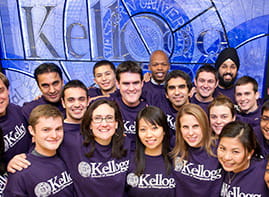The Innovating Social Change Conference explores nontraditional methods for inciting social change
10/20/2009 - Social change isn’t just for nonprofits anymore. Increasingly, for-profit businesses are using innovative methods to address the greater good while satisfying the bottom line.
 |
Related Video |
|
| |
Those methods were explored in greater detail at the Kellogg School’s Innovating Social Change Conference, held Oct. 14 at the James L. Allen Center. Addressing the theme of “Innovation: A Catalyst for Social Change Across Sectors,” leaders from the public, private and nonprofit sectors shared their strategies for integrating social change into their business practices.
A morning panel session kicked off with a discussion on how the terms “nonprofit” and “for-profit” are becoming obsolete. John Wood ’89, founder and president of Room to Read — an organization that builds libraries and schools in developing countries — explained that many companies are feeling pressure to take a stance on social and environmental issues. Businesses are expected to operate in an ethical way, regardless of their status as a nonprofit or for-profit.
Wood expressed that he was glad to see this shift. “I hate the term nonprofit,” he said. “It defines you not by what you do but what you don’t do.”
Jonathan Greenblatt ’99, the founder of Ethos Water — a bottled water company that supports humanitarian water programs — and founder and president of Our Good Works, agreed that the terms no longer apply. Moreover, it’s important for socially driven companies to think about profits, because that’s what allows you to make a bigger impact.
“There is nothing wrong with making money,” Greenblatt said. “Ethos wouldn’t have worked if it weren’t at a high margin volume. Part of the reason why we sold Ethos to Starbucks is because Starbucks has amazing scale … and the ambition was to help [more] children get clean water.”
At the conclusion of the discussion, Greenblatt urged Kellogg students to think about how they can make a contribution to society regardless of their chosen career path.
“Don’t feel like you need to wait to give back,” he said. “You don’t need to go join Ethos water; you can be a social intrapreneur in corporate environments, at places like Kraft, Clorox or Morgan Stanley. Don’t think that divorces you from doing something responsible.”
During the afternoon “Innovative Investing Panel,” four investors shared their traditional and non-traditional strategies for supporting social change.
“We believe that there are many ways to do good in the world with capital,” said Seth Miller ’98, a partner at DBL Investors, who explained that his venture capital firm invests in companies that deliver capital returns while enabling social, environmental and economic improvements in the low- and moderate-income neighborhoods of San Francisco. “We’re trying to change the way that for-profits work in the world — to direct traditional capital to impact the world in a positive way.”
Dr. Sanjay Sinho, CEO of the American India Foundation, shared how his development organization invests in non-governmental organizations as a means to accelerate social and economic change in India. While the foundation initially had a “welfare approach,” it now works with its partners to implement programs in the sectors of education, livelihood and public health.
“We don’t just think about giving them a fish or teaching them how to fish,” he said, citing the adage. “We think about, do they have access to the lake? Is there pollution in the lake? Can they leave their house to go to the lake? We take a transformational approach.
“When I think of social investing, I think about investing in a high structure of human dignity,” he said.
The Innovating Social Change Conference was organized by the Kellogg School’s Net Impact Club, a student organization that is dedicated to providing learning and networking opportunities to Kellogg students interested in socially responsible businesses and nonprofit management.






